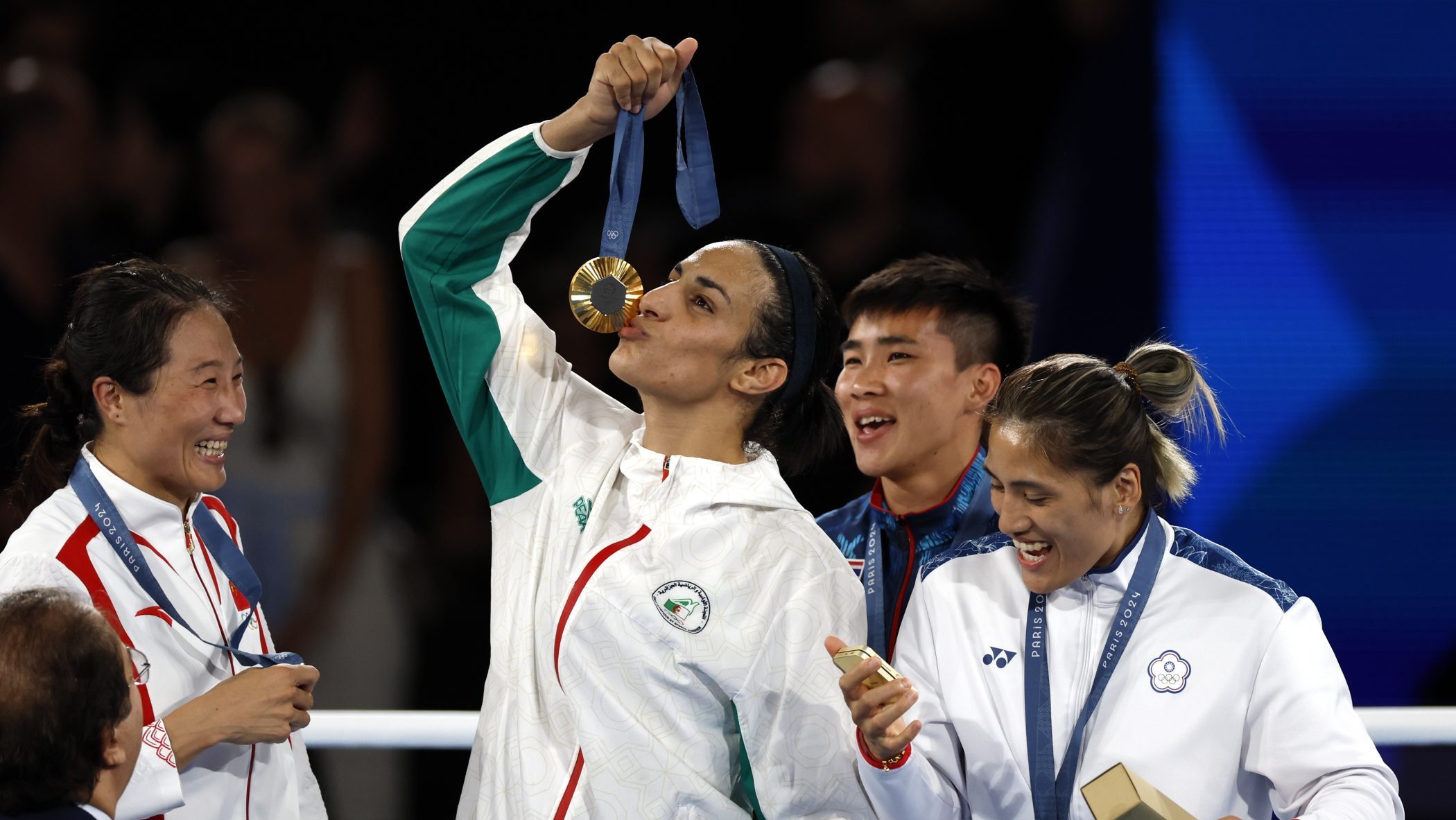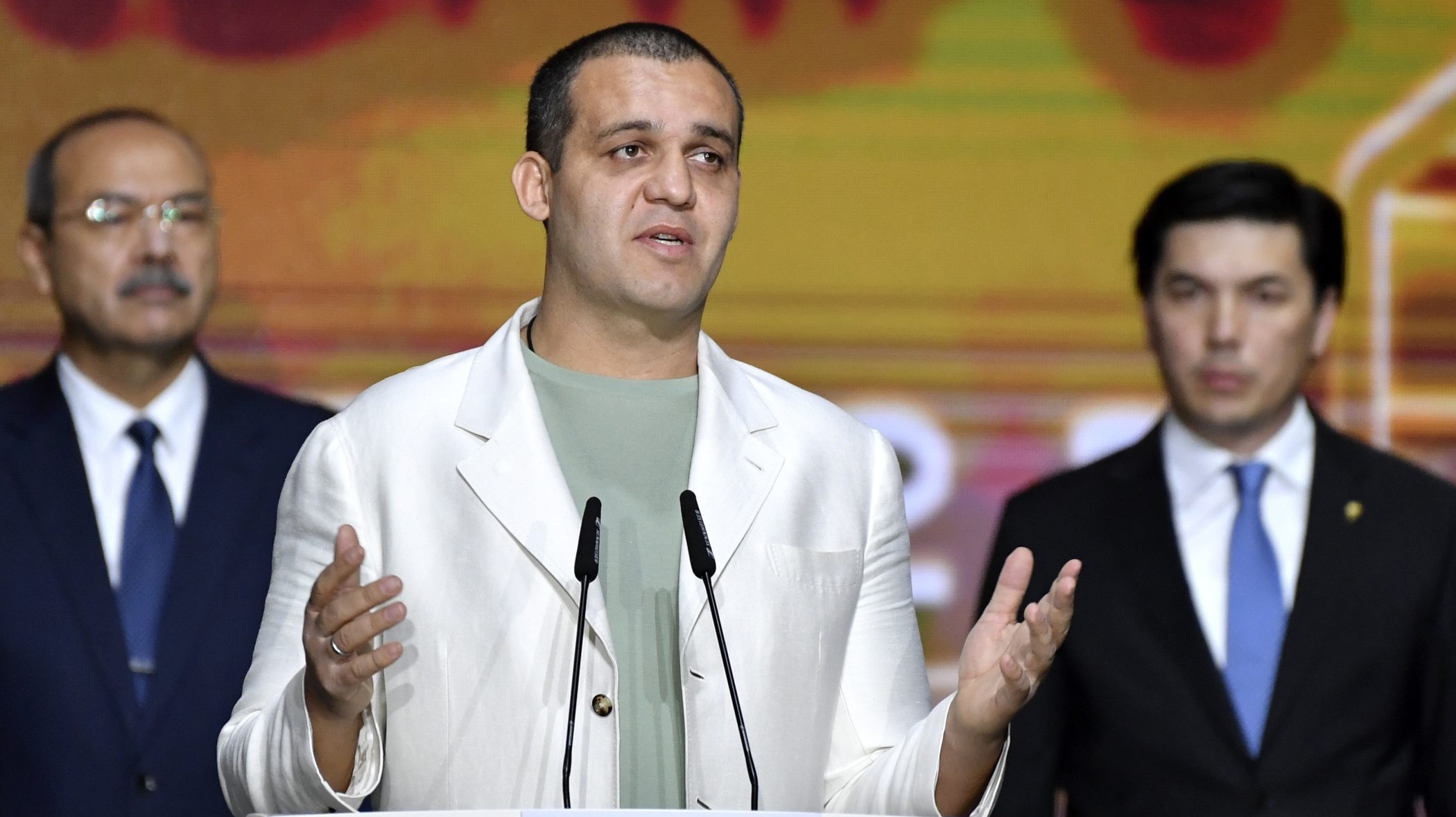This post is also available in: Bosnian
Pro-Russian accounts, which had already been identified as manufacturers of disinformation, seized on the topic of Khelif’s gender after her overwhelming defeat of an Italian boxer in her first bout.
The Associated Press reported that pro-Russian accounts on X boosted the topic on the social media platform by making the boxer’s name appear tens of thousands of times in just 60 minutes, according to a PeakMetrics analysis.
Experts interviewed by Detektor explained that the attacks on Khelif originated in Russian disinformation circles, then spilled over into the Bosnian media and circulated among domestic social media users.
The comments focused on false allegations that Khelif is not a woman but transgender, and included claims that she had an advantage over the Italian boxer she defeated because she was born a man.
The pressure on Khelif on social media was so strong that her father even showed a Reuters news agency crew his daughter’s birth certificate to confirm that she was born a girl.
Vesna Radojevic, a journalist with Krik, a Serbian investigative media outlet, and editor of the Raskrinkavanje fact-checking site, explained to Detektor the origins of the story about Khelif being a man or a transgender person.
“Of all people, it originated from the president of the International Boxing Organisation, who is very close to Vladimir Putin. A test that Khelif underwent after beating a Russian boxer in 2023, which she allegedly failed, was not transparent and IBA is the only source for such allegations,” said Radojevic.
IBA is the International Boxing Association led by Umar Kremlev. In 2023, Khelif and Taiwanese female boxer Lin Yu-ting were suspended from the IBA because it claimed they had “a competitive advantage over other female competitors”.
Commenting on the two boxers following their suspension from the IBA, Kremlev said that the athletes “had XY chromosomes in their bodies”, and that they “pretended to be women”. But the International Olympic Committee, IOC, dismissed the IBA tests.
“The whole process was flawed. From the conception of the test, to how the test was shared with us, to how the tests have become public. It was so flawed that it’s impossible to engage with it,” said an IOC spokesperson.
Putin’s pal in top position
 Imane Khelif (center) after winning the gold medal. Photo: EPA-EFE/MAST IRHAM
Imane Khelif (center) after winning the gold medal. Photo: EPA-EFE/MAST IRHAM
IBA chief Kremlev is an ally of Putin, and a recipient of Russia’s Order of Saint George, the country’s highest military award. He is also a former member of the Night Wolves, a biker group that tries to spread Russian influence in Europe.
Detektor has previously revealed that the Night Wolves enjoy the protection of the Republika Srpska authorities and take part in official celebrations of the Day of Republika Srpska, which has been declared unconstitutional by the Constitutional Court of Bosnia and Herzegovina.
The Night Wolves’ leader, Alexander Zaldostanov, alias The Surgeon, is banned from entering Bosnia and Herzegovina.
Like Kremlev, Zaldostanov a close friend of the Russian president. Since 2014, he has been on US’s blacklist, alongside other members of the Night Wolves, after participating in the Russian annexation of Crimea and the pro-Russian rebellion in Donbas in eastern Ukraine. The Night Wolves and Zaldostanov were added to the EU sanctions list in July 2022 for supporting the violation of Ukraine’s territorial integrity.
But the influence of pro-Russian groups is more widespread than this. Over the past few months, the Olympic Games have been a specific target for Russian propaganda, and news outlets such as Krik have experienced it firsthand.
“For months already, fact-checking organisations worldwide have been receiving emails relating to the Olympic Games in Paris, which allegedly contained information that needs to be checked. They mostly referred to the safety of the participants in Paris and the conditions in which the athletes were staying,” said Radojevic.
According to Radojevic, all these emails probably originated from a Russian source, and were aimed at introducing suspicion into the public debate around the Games .
“That’s often the way in which Moscow’s services, which are already commonly known for their successful disinformation-spreading campaigns, particularly at some specific points in time, operate. Their troll and bot factories, their various media channels and the powerful people who support them, help them be very successful in the hybrid warfare business,” Radojevic said.
The French authorities also encountered physical sabotage that disrupted the railway network at the beginning of the Olympics, which was accompanied by online disinformation aimed at discrediting the host country. Numerous experts believe that France is facing particularly pronounced disinformation attacks due to its military support for Ukraine during the full-scale Russian invasion.
According to Associated Press, the wave of comments and media reports on Khelif’s gender was caused by her failing the controversial test which she underwent at the hands of the International Boxing Association, IBA, in 2023.
The IBA has been managed for years by people like Kremlev who are associated with pro-Russian groups promoting Moscow’s policies and “family values”, both in Europe and globally.
Controversy surrounds boxing organisation
The International Olympic Committee withdrew recognition of the IBA in 2019 over concerns about judging and refereeing, financial stability and governance, The Guardian reported. The IOC then expelled the IBA last year.
When the collaboration was terminated, the IBA was led by Uzbekistani Gafur Rakhimov, who was sanctioned by the US due to his alleged links with crime and drug trafficking, Le Monde reported.
According to the Associated Press, the reason for the move lay in a series of scandals, countless cases of financial malfeasance and strange leadership decisions. Kremlev also made Russian state-owned energy company Gazprom the main sponsor of the IBA, and most of the events organised by the association take place in Russia.
The last Olympic Games in which the IBA participated as an umbrella boxing organisation were in Rio de Janeiro in 2016. More than 30 countries have left the IBA and formed a new association, World Boxing.
Khelif said the hatred she has had to endure due to erroneous assumptions “harms human dignity”, and called for an end to the harassment of athletes.
Her lawyer Nabil Boudi said the online material about her has been viewed more than 100 million times online, Al Jazeera reported.
Spreading of hatred
 Umar Kremlev. Photo: EPA-EFE/STRINGER
Umar Kremlev. Photo: EPA-EFE/STRINGER
Radojevic argued that what makes the spreading of disinformation effective is the manipulation of emotions that cause discomfort, fear and anger, as well as the social media algorithms that favour sensationalism.
“What is specific to the case of Imane Khelif is that very powerful people have made negative comments about her on social media, like Elon Musk, but also conservative politicians like Donald Trump and the Italian prime minister. Of course, when people in such positions spread certain information, it is shared further at the speed of light and has major repercussions. In this case, it is about racism, misogyny and transphobia,” Radojevic said.
This misogyny and transphobia swept through social media in just 24 hours, taking on the aspects of a criminal offence, according to Tea Pokrajcic of the Human Rights House NGO in Banja Luka.
Although Khelif is not a transgender person, Pokrajcic said that her case highlights issues with transphobic hate speech.
“If someone is a little outside the gender identity pattern, it is immediately a problem,” Pokrajcic said.
This provokes a surge of hatred and calls for violence, she added.
“Through this example from the Olympics, we can see that it does not happen just here in our backwards patriarchal society in Bosnia and Herzegovina, but it actually happens throughout the world, and hardly any country is entirely free from it,” she said.
She added that that transgender people, women in particular, suffer a disproportionately high level of discrimination and violence.
“In all professions, particularly in sports, women cannot protect themselves from comments based on their appearance. Successes and results are at the periphery of what people think about – is she beautiful or masculine, is she attractive or not, does she wear low-cut tops or, God forbid, tight-fitting clothes? You will rarely hear men’s appearance being commented on, unless they are effeminate,” she said.
Radojevic sees Khelif’s case as an example of how even people who aren’t inclined towards spreading disinformation can “stumble” and believe in something that is not true.
“This case had it all – global attention due to the Olympic Games, mystery, controversial decisions to disqualify her from previous competitions, powerful people spreading messages,” she said.
However, she added that there were people on social media who said: “This cannot possibly be the whole picture.”
“Those who had previously written some bad comments about said that they had gathered additional information and changed their opinion accordingly. I find this very positive – small but important steps in promoting responsibility for what is said in public,” said Radojevic.
The speculation about Khelif was encouraged by malicious individuals, argued Boudi.
“The investigation will determine who was behind this misogynist, racist and sexist campaign, but will also have to concern itself with those who fuelled the online lynching,” the Algerian boxer’s lawyer said.


